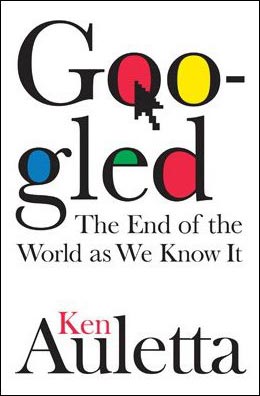Nerds with worldwide reach |
 |
| John Fanning on a book about the phenomenon that is Google and the two young men who pioneered it |
Google, which is widely regarded as the most astonishing business phenomenon of the 20th century, or any century for that matter, has understandably attracted the attention of authors anxious to make a killing on the story and already a slew of books charting the company's exponential growth have appeared on the bookshelves.
Ken Auletta's simply and appropriately titled Googled appears to be the most authoritative as the author is not only a highly experienced journalist and writer who has specialised in new media and the digital age but who also had unrivalled access to the company over a prolonged period. Since the book appeared there have been reports that it has attracted the attention of Hollywood and may be turned into a film.
It's a dramatic enough story. Back in 1995 two young gifted mathematical whizz kids straight out of central casting met at the creative and intellectual nexus of Silicon Valley, Stanford University. Although Sergey Brin was born on Moscow and Larry Page hailed from Michigan, their backgrounds were remarkably similar.
Brin's parents were mathematicians, his grandfather was a Maths professor and his great-grandmother was a microbiologist. Page's father was a professor of computer science and his mother had a master's in computer science. Both ended up in Stanford and in 1995 legend has it that on an orientation day Page, the newcomer, began arguing with Brin, a second year PhD student and tour guide, of whom he said “whose opinionated obnoxiousness so closely resembled his own'.
Presumably that's how geekish love stories begin. It was in Stanford that they came up with the idea which measured the importance of a web page by counting how often other web pages linked to it. Thus Google was born. Unlike many clever start-up high tech companies Sergey and Larry figured out almost from the start, how to make big money from their big idea, ironically enough from attracting small ads.
Google's ads only appear in front of people who have already indicated, through their search, a specific interest in the product or service area. From those little ads an almighty acorn, the like of which the world has never seen, has grown.
 |
FULLY COMPUTEGoogled – The End of the World As We Know It by Ken Auletta is published by Penguin Press. |
But to add insult to further irony, our two Google heroes have a deep and abiding distrust of the whole marketing communications business; “Brin and Page resisted ads because they shared an allergy then common among Webheads and many folks who attended Burning Man; that advertising was like a rude stranger interrupting a conversation to sell you something you neither wanted or needed”.
(Burning Man is the West Coast week long hippy fest famous for its resolutely non-commercial ethos where all goods are shared or bartered). One of the most interesting aspects of the book is how the hippy and geek instincts of many Silicon Valley entrepreneurs are tempered by a colourful cast of business and financial management types who populate the Valley and are on hand to explain world's wicked ways.
Brin and Page needed this kind of advice because, although both were blessed with the analytic intelligence of an Einstein, they appear to have the emotional intelligence of a Gordon Brown. They managed to correctly identify what sets the digital age apart from others; the sheer velocity of change and development.
This meant they needed to create a culture of continuous innovation at which they succeeded admirably exemplified by their decision to allow all staff 20 per cent of their time to work on projects of their own choosing. But constant change can exert a price and in spite of the runaway growth and soaring profits there is a curious sense of foreboding coming out of this story; an unspoken fear that at this very moment two equally driven nerds in a garage in China are hatching an idea that will bowl a googly at Google. They also have to cope with the fact that no matter how well intentioned they may be, as evidenced by their slightly mawkish slogan 'don't be evil', anything as big and powerful as Google is bound to attract criticism.
Towards the end of the book, the author alludes to fears that Google's methodology and ubiquity may create a superficial relationship with information, that we may start to think like a computer – “our consciousness will thin out and flatten as our minds are trained link by link to DO THIS with what you find HERE and go THERE with the result”. We need to be alert to these fears but we also need to understand the company that has had such a profound effect on the world of marketing communications. This book is ideally suited to that task.









